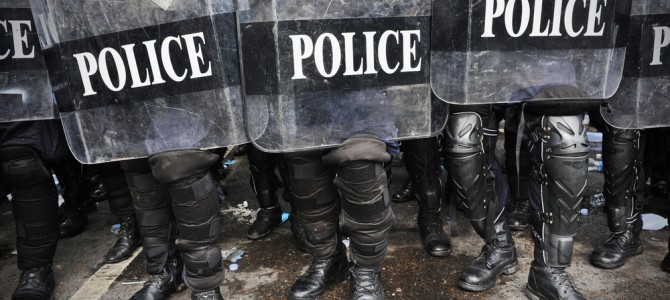
Recently I wrote that, in many localities and for all intents and purposes, the police no longer work for you: depending on where you live, there is a high probability that local law enforcement runs like a corrupt banana republic goon squad and that your life and property are at very high risk in a very real way.
A notable example came from Fairfax County in Northern Virginia, where these days the cops bust high-stakes poker games and steal as much money as they can from innocent card-players. Not to be outdone, I see Chicago has apparently been running its very own Ministry of Love on the west side of the city:
The Chicago police department operates an off-the-books interrogation compound, rendering Americans unable to be found by family or attorneys while locked inside what lawyers say is the domestic equivalent of a CIA black site.
The facility, a nondescript warehouse on Chicago’s west side known as Homan Square, has long been the scene of secretive work by special police units. Interviews with local attorneys and one protester who spent the better part of a day shackled in Homan Square describe operations that deny access to basic constitutional rights.
This being Chicago, perhaps we shouldn’t be surprised to find that the cops have resorted to such cowardly and unscrupulous tactics. Then again, in a broader sense there isn’t much to be surprised about.
Our Police System Needs Reform
In recent years, Americans have shown a startling and dismaying tendency to put up with the most unseemly, violent, and illegal behavior from their local police departments. Many of us are still at least nominally suspicious of the federal government, but when it comes to the police, we seem almost eager to roll over and allow them to do as they please. For all the Twitter indignation this story will cause, I’m sadly convinced it won’t in the end really matter. Probably nothing will change, Chicago police will continue to abuse the fundamental rights of their constituents, and everyone will soon forget that this was ever even a brief Internet Moral Outrage. Increasingly, this is who we are as a people.
Without substantial reform, there is little we can do to fix this sad state of affairs in which police officers are flagrantly contemptuous of the law yet suffer no consequences. Police officers, like public school teachers, have strong unions; like public teacher unions, police unions often work for the benefit of their inept and inadequate members. The purpose of a union is generally not to make the world a better place but to enrich and insulate the people lucky enough to be a part of the union itself.
There’s a reason, for instance, that it’s called the American Federation of Teachers and not Teaching. Then too, police unions do not exist to make the enforcement of law more equitable and egalitarian; more often than not they work to shield unfit and violent men and women from the just consequences of their actions (occasionally they work hard to stifle competition, as well). Police reform—the kind that would end the barbarism in Chicago—will not come from the ranks of the police; it will come from Americans, if we can ever rouse the motivation to actually care about it.
Militarizing the Police Makes Things Worse
In the meantime, we can expect things to continue apace. Even before the revelations of Chicago’s alleged “black site” at Homan Square, there was evidence that the Chicago Police Department was a corrupt and amoral organization: thievery, intimidation of whistleblowers and threats of violence appear to be the norm in the department (as reported by a police officer at Homan Square, no less). Many Illinois police forces, like police across the country, have benefitted from the LESO military equipment program and have received numerous military-grade weapons and vehicles—presumably to deal with the ruthless terrorist cells one finds in towns like Carbondale and Mechanicsburg.
The militarized armament alongside the corruption and black ops is not an accident or a coincidence. When police officers disdain and abuse peoples’ basic liberties, they will ultimately become afraid and wary of the people themselves. There is exactly no real reason for the sheriff’s department of Kankakee, Illinois to possess a Mine-Resistant Ambush-Protected vehicle. The county lists exactly one line-of-duty death, all the way back in 1986. Nevertheless, the county apparently feels the need to prepare for both mines and ambushes. What does that say about county leaders’ feelings towards their constituents?
There is a sad tendency among my fellow conservatives and libertarians to give an enormous amount of deference to local police forces: where an illegal and brutal government action would be soundly rebuked by the Right if done by the Bureau of Alcohol, Tobacco, Firearms, and Explosives, many of the same people are indifferent or even supportive of the same thing when done by a cop from a nearby police station.
“We need to support our police officers,” they claim. “They are heroes who do thankless work without which we’d all be in danger.” Assuredly this is true in many cases, and our gratitude should go to the brave men and women who keep us free from harm each day and in an unglamorous way. Yet cops are not saints. Some of them are incompetent, vicious, unfit to hold a badge, and deserving of great moral censure, if not legal consequences. Learning to tell the difference between good cops and violent and corrupt cops is vital if we are to remain a free society and a free people. We either make the distinction, or we end up like Chicago—a dismal thing to contemplate, even by banana republic standards.









